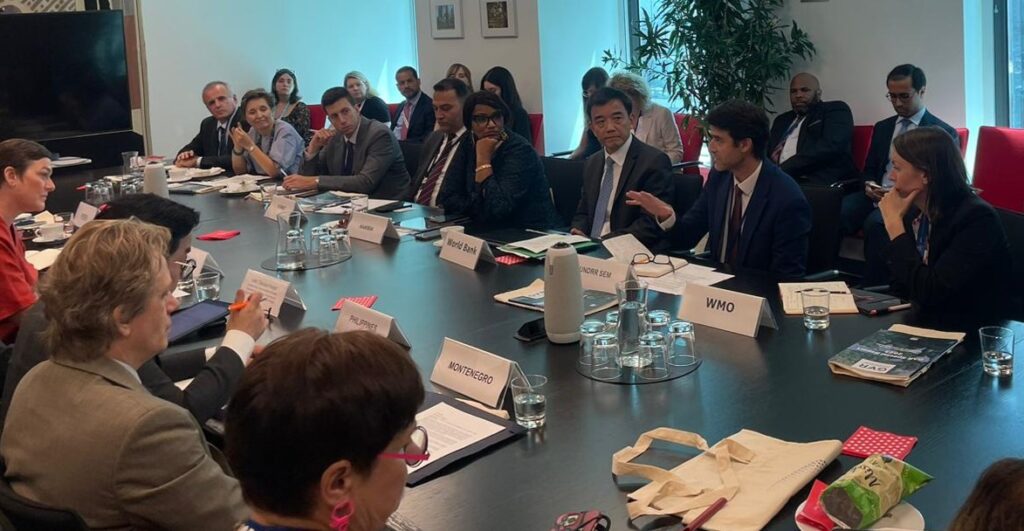During HLPF 2024, GNDR is in New York representing civil society, advocating for our members’ call to action messages and supporting Sendai stakeholders in integrating disaster risk reduction into the sustainable development goals.
Becky Murphy, GNDR’s Policy Lead and Marcos Concepcion Raba, GNDR’s Executive Director, are in New York and will be sharing an HLPF GNDR members briefing throughout the week.
These are the key messages coming from the third day’s key sessions:
Wednesday 10 July 2024
High Level Session: SDG 13 and interlinkages with other SDGs – Climate action
- Sophie Rigg represented GNDR from the floor
- Becky and Marcos observed from the balcony
Summary:
- Countries and stakeholders highlighted how far off track we are on SDG13 and the desperate need to act between now and 2030.
- Economically wealthy nations predominantly focused on the work they are doing domestically on cutting emissions.
- Economically disadvantaged nations spoke of the need for climate finance and the importance of collective action
Interventions of particular note:
- WEDO – they spoke powerfully of the frustration that we have not progressed more since the Rio summit. They highlighted how the current patriarchal and white supremacist global power system prevents progress. They called for transformational systems change and for us to stop ‘tinkering at the edges’.
- Ukraine and Russia both spoke:
- Ukraine highlighted the environmental costs and carbon footprint of war, they called for an end to all wars and also expressed their commitment to global efforts to reduce emission and tackle the climate crisis ;
- Russia spoke of their support for broad COP processes; they also spoke of the need for carbon capture and storage and an emissions trading system to enable a just transition. They did not speak of the war. They had not finished their statement after three minutes and were cut off.
- India and China – both spoke of the importance of climate finance by those that are historically responsible under the UNFCCC and the importance of common but differentiated responsibility. As such they removed responsibility from themselves for contributing to climate finance.
- United States: They spoke of their domestic work on reducing emissions and transforming the economy with the inflation reduction act. They also spoke of their adaptation and resilience development work – they did not speak meaningfully on climate finance.
- UNDRR– they spoke of Cyclone Beryl and how the relatively low loss of life is thanks to DRR approaches. They highlighted the need for integrating climate, DRR and development and the importance of a risk-informed approach going forward.
- UNHCR – spoke of the importance of Leave No One Behind (LNOB) and that climate finance reaches the most vulnerable, with a particular focus on migrants.
- UNEP – they highlighted the importance of climate action for the other SDGs and integrating climate into development planning. They see an opportunity for sustainable development through climate action. But they stressed how this all needs finance.
A conclusion:
- Nations reiterated their existing positions, stakeholders called for transformational change and UN agencies stood ready to support nations in their climate action
- Much more is needed on all fronts, but the energy and ambition was lacking in the room
UNDRR closed door side event hosted by the Swiss Mission on the road to the global platform for DRR
Marcos spoke on the round table and Becky interjected from the floor.
- Becky and Marcos were invited to join UNDRR’s side event at the Swiss Mission focusing on the road to the Global Platform for DRR
- Here the friends of DRR group, member states hosting the regional and global platforms shared the plans, progress and aims of the coming few months as we lead up to both the regional and global platforms
- Key issues discussed included the need for the whole of society approach, the need for financing for development to integrate a risk-informed approach and the continued demand for localisation
- Here, Marcos represented the Sendai SEM and shared what the SEM is doing to engage non member state stakeholders ahead of the regional and global platforms, reinforcing the importance of having a formal structure for non member state stakeholders to engage with the implementation and monitoring of the Sendai framework and supporting risk reduction to be integrated into the SDGs and Paris agreement too
- Becky spoke from the floor, asking member states what they would like to see the SEM to bring to the table at the regional and global platforms and what they would like us to focus our efforts on in the path ahead
- Members states and Kamal Kishore, the new UNDRR SRSG, called for support from the SEM and civil society to make sure we take the space provided for us at the regional and global platforms, to make sure we support UNDRR and member states in raising the energy and pressure around risk reduction and support in reaching the most marginalised and hard to access members of society, who often member states cannot reach
